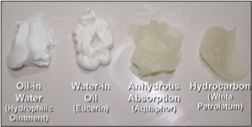SL22107-Lec P12: Topical Drug Delivery 2
1/34
There's no tags or description
Looks like no tags are added yet.
Name | Mastery | Learn | Test | Matching | Spaced |
|---|
No study sessions yet.
35 Terms
what are some considerations in formulation of pharmaceuticals
Interactions of vehicle with skin (but be careful of risk of damage of stratum corneum)
Interaction between drug and vehicle
Why can vehicles be irritating to the skin
May induce an immunological response if skin barrier is damaged
Drug physicochemical properties
MW
Lipophilicity
H-bonding ability
Solubility in solvents
all these properties are assessed via a decision tree
Describe 4 types of formulation
O/W: can cause occlusion
W/O
Anhydrous absorption
Hydrocarbon

What is preferred for chronic skin disease
hydrocarbon-based formulations preferred for their occlusive and protective properties
good emollients
limited release system due to poor solubility
anhydrous fomrulation and hydrocarbon
Anhydrous formulations are usually very sticky and greasy, providing a high level of skin occlusion.
Water free formultions
Semi-solid system
PEG or triglycerides
used for psoriasis, eczema
used for small areas of application
Steroid ointment
Composed of
oil
surfactant: stabiliser allows movement of drug from oil into mortar (lipids) of the skin
Buffer system: baalnces. PH
preseratives
Polar gel
Single phase
water + alcohol based, low lipid content
not good for psorasis and excema as it is drying
preferred for anti-allergics, anti inflammatories
Gelling agents
thickens solutions and suspensions
ØHydrogels containing a dispersed lipid phase = emulsion gel (e.g., emulgel*).
ØSuspension gels = suspensions of water-insoluble drugs in hydrogels
Anti-virals
are slightly basic
may change pH balance
causes immunological response
Gel formulations
Hydrogels: holds water semi solid large molecules interpenetrated with water
Emugel: 2 phase system
usually transparent or small semi solids
readily absorbed
cool: evaporative cooling of skin due to latent heat of evaporation
However residual film formulation of polymers
Creams
Emulsion: 2 immiscible liquids
requires emulsifies to stabilise O/W
dispersion of O/W determines on strucute and arrangment of micelles
w/o creams
lotion: hydrophobic semi liquid water and lipid phase
cream: hydrophobic semi'-solid water and lipid phase
2 phase system
hydrating
treats psorasis
O/W
Lotion: hydrophilic, semi sold, 2 phase
Cream: hydrophilic, semi solid, 2 phase
Dry skin: coats the area
treats acne
low lipid replenishing effect
hydrating
non-occlusive
cooling
emulsions
o/w emulsions more cosmetically appealing (less sticky and greasy) as lipids therein are finely dispersed.
however, o/w emulsions can withdraw moisture from skin due to surfactant-like emulsifiers (SC lipid extraction/perturbation).
ointment vs cream
non-equivalence
have different pharmacological outcome in terms of efficiency, consistency also rate of delivery and concentration
Vehicles of delivery
Absorption base: composed of hydrocarbon base which is largely inabsorbed by skin
liposome: phospholipid outer layer and hydrophilic core
nanoemulsion: vesicles of phospholipid, surfactant, lipid + water
microemulsion: smallest, tiny emulsions of lipophilic and hydrophilic surfactants in water
emulsifier free system
2 phases
semi solid
hydrophilic and continuous aqueous phase and lipids
multiple emulsion
3 phases
semi solid
hydrophilic
hydrophobic
spray emulsion
e.g. sunscreen
needs to hit skin and coat the skin
difficult for permeation of drug
foam/mousse
gas dispersion in liquids
lipids + water
stablasised with surfactant
water free systems
2 non-miscible phases
partitions from one phase into the other
Lacquers
e.g. nail polish
polymeric firm builds
used for skin and nail
what is formulation metamorphis
when a formulation is applied to the skin it changes dynamically over time
due to absorption, reaction with skin, characteristics, concentrations, time to reach max saturation
as its rubbed into the skin
volatile excipients evapoate
increased viscosity of formulation
what can rubbing cause
increases elasticity leading to emulsifying effects
what can evaporation lead to
desired cooling effect
desirable for repellent/fragrance
Can increase or decrease drug solubility and skin penetration
changing to supersaturated system leading to increased flux rate
solvents/co-solvents
used to alter solubility of drug in stratum corneum
can enhance delivery
e.g. PEG can limit dehydration of skin
however if improperly prepared can lead to mass poisoning
nsaids
targets cox inhibits cox 2
reduces prostaglandins, leukotrines
decreased mucus
gi effects
considerations of delivery
targeting pathways
targeting pain site
regional differences due to different properties in the populations skin
side effects
bioavailability
gels
used to treat muscle and joint pain for inflammation e.g. NSAID
through SC delivery
good for local inflammation reduces side effects of systemic exposure
good distribution with systemic side effects
diffusion and partition of NSAIDS
mostly water soluble
alcohols on skin
Hydrophilic
Very volatile substance it will evaporate on the skin which can be safe in some instances as it does’t absorbed into the skin less risk of systemic effects
non newtonian
its solid when force isn’t applied as gravity doesn’t affect it
no distribution no flocculation
which leads to consistent dosing
decision tree
water/oil soluble, does it partition?
do we choose cream, ointment, lotion
intended location skin surface, does it need to travel to a target site